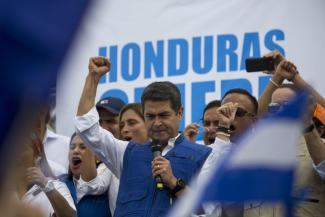Elections
No transparency

The election was controversial even before it took place. The reason was that Hernández ran in spite of the constitution ruling out a second term (see my comment in D+C/E+Z/D+C). He was able to do so because he managed to bring the Supreme Court and the election commission under his control. There no longer are separate branches of government.
In order to prevent Hernández’ re-election, the centre-left PINU party and the LIBRE party of Manuel Zelaya, a former president, joined forces. Salvador Nasralla, a former sports reporter, was the candidate of their “alliance against dictatorship”.
During the campaign, opportunities were not equal. The oligarchy controls all major media, so even Hernández’ critics expected him to win. To everyone’s surprise, however, the first projection showed that Nasralla was leading by five percent. Nonetheless, Hernández declared that he had won that night. Nasralla claimed victory too.
The election commission was in a jam. Then its computer system failed, and no more results were announced. Three days later, with the system up and running again, data showed Hernández leading by a small a margin. Public frustration was widespread, and rumours spread fast.
According to the ruling party, the votes in rural areas – in particular the region where Hernandez is from – could only be counted late. However, it hardly seems credible that rural votes made the difference. For Hernandez to overcome Nasralla, all citizens of the president’s home department would have had to have cast their ballots for him. That was not the case. Forged documents were found soon.
People expressed their anger in peaceful protests, but there was occasional rioting too. The government declared a state of emergency and a curfew. The police and armed forces killed more than 30 persons.
Three weeks after the election, the election commission officially announced that Hernandez had won. The opposition contested the result, but the powerful elite – including the church, the military and business leaders – fast expressed support for Hernández.
Election observers from the EU and the OAS (Organization of American States) noted that the vote counting and been seriously flawed. The OAS proposed a rerun of the election, but Hernández stated that the OAS was interfering in domestic affairs. The truth is that Honduras does not simply need a new election; the country’s democracy needs a comprehensive reboot. Unfortunately, the OAS is unlikely to act in a stringent manner, and some members, including the USA, have actually accepted Hernandez’ triumph.
The new presidential term will start on 27 January. In the run up, Hernández said he wants to hold a national dialogue. The opposition, so far, rejects the idea since one implication would be the acceptance of Hernandez’ second term. Opposition leaders are still rallying people to protest. At the same time, they are discussing among one another how to forge an alliance against Hernandez in the parliament.
The election and its aftermath have shown that Honduras is neither really independent nor a true democracy. The US administration wants the country to serve as strategically relevant partner in Central America, expecting it to support Washington unconditionally. In this context, it is of minor relevance that the Hernández government is evidently involved in the illegal drug trade.
A new trend is that people have been becoming politically more aware in recent weeks. A large share is younger than 30, and this generation will keep fighting for a better future.
Rita Trautmann is a social anthropologist who worked in Honduras for the Deutscher Entwicklungsdienst, which has since been merged with GIZ. She has been active in human-rights campaigns since 2011.
trari@protonmail.com
Blog: http://hondurasdelegation.blogspot.de/search/label/Delegation2016
Link
Amnesty International: Background information.
https://www.amnesty.ca/news/honduras-state-must-ensure-right-%C2%A0peaceful-assembly






